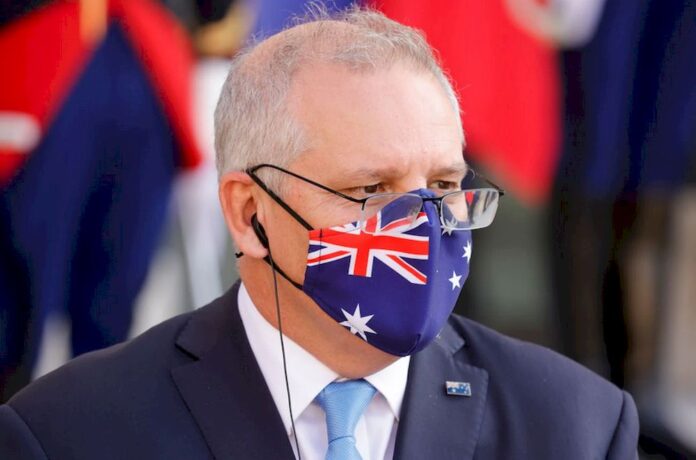Australian Prime Minister Scott Morrison looks on during a news conference with French President Emmanuel Macron in front of the Elysee Palace in Paris, France, June 15, 2021. — Reuters pic
SYDNEY, Oct 7 — Australia’s prime minister lambasted social media today as “a coward’s palace”, saying platforms should be treated as publishers when defamatory comments by unidentified people are posted, pouring fuel on a raging debate over the country’s libel laws.
Prime Minister Scott Morrison’s comments suggest he would favour making companies like Facebook Inc liable for defamation with regards to some content posted by third parties, a position that could further cement Australia’s outlier status on the subject.
The country’s highest court ruled last month that publishers can be held liable for public comments on online forums, a judgement that has pitted Facebook and news organisations against each other and spread alarm among all sectors that engage with the public via social media.
That in turn has lent new urgency to an ongoing review of Australia’s defamation laws, with the federal attorney general this week writing to state counterparts stressing the importance of tackling the issue.
“Social media has become a coward’s palace where people can go on there, not say who they are, destroy people’s lives, and say the most foul and offensive things to people, and do so with impunity,” Morrison told reporters in Canberra.
“They should have to identify who they are, and the companies, if they’re not going to say who they are, well, they’re not a platform anymore, they’re a publisher. You can expect us to be leaning further into this,” he added.
A Facebook spokesperson did not directly respond to a Reuters question about Morrison’s remarks, but said the company was actively engaging with the review.
“We support modernisation of Australia’s uniform defamation laws and hope for greater clarity and certainty in this area,” the spokesperson said. “Recent court decisions have reaffirmed the need for such law reform.”
A representative for Twitter Inc’s Australian unit did not address the question of potential liability but said “anonymity or pseudonymity is not a shield against Terms of Service violations, and Twitter will take action against any accounts that are in violation of the Twitter Rules”.
Since the court ruling, CNN, which is owned by AT&T Inc, has blocked Australians from its Facebook pages, citing concern about defamation liability, while the Australian arm of British newspaper the Guardian says it has disabled comments below most articles posted to the platform.
Australia has butted heads with Facebook previously, enacting a new law this year that forces it and Google to pay for links to media companies’ content.
Review in focus
Federal Attorney-General Michaelia Cash said in an October 6 letter to state counterparts that she had “received considerable feedback from stakeholders regarding the potential implications of the High Court’s decision”.
“While I refrain from commenting on the merits of the Court’s decision, it is clear … that our work to ensure that defamation law is fit-for-purpose in the digital age remains critical,” said the letter which was seen by Reuters.
No timeline has been given for how long the review might last. New South Wales state Attorney General Mark Speakman, who is leading it, said media, social media and law firms attended three consultations in the past month.
The review, which has been running through 2021, has published 36 submissions on its website, including one from Facebook which says it should not be held liable for defamatory comments since it has relatively little ability to monitor and remove content posted under publishers’ pages.
While news outlets were among the first to criticise the ruling, lawyers have warned all Australian sectors which rely on social media to interact with the public are potentially liable.
“The decision has significant implications for those who operate online forums … which allow third-parties to make comments,” a Law Council of Australia spokesperson said. “It is not limited to news organisations.”
The leaders of the state of Tasmania and the Australian Capital Territory, home to Canberra, are among those who have disabled comments from Facebook pages, citing the High Court ruling. — Reuters


